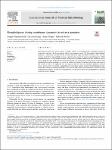Phospholipases during membrane dynamics in malaria parasites
Flammersfeld, Ansgar
Lang, Christina
Flieger, Antje
Pradel, Gabriele
Plasmodium parasites, the causative agents of malaria, display a well-regulated lipid metabolism required to ensure their survival in the human host as well as in the mosquito vector. The fine-tuning of lipid metabolic pathways is particularly important for the parasites during the rapid erythrocytic infection cycles, and thus enzymes involved in lipid metabolic processes represent prime targets for malaria chemotherapeutics. While plasmodial enzymes involved in lipid synthesis and acquisition have been studied in the past, to date not much is known about the roles of phospholipases for proliferation and transmission of the malaria parasite. These phospholipid-hydrolyzing esterases are crucial for membrane dynamics during host cell infection and egress by the parasite as well as for replication and cell signaling, and thus they are considered important virulence factors. In this review, we provide a comprehensive bioinformatic analysis of plasmodial phospholipases identified to date. We further summarize previous findings on the lipid metabolism of Plasmodium, highlight the roles of phospholipases during parasite life-cycle progression, and discuss the plasmodial phospholipases as potential targets for malaria therapy.
Dateien zu dieser Publikation
Keine Lizenzangabe

